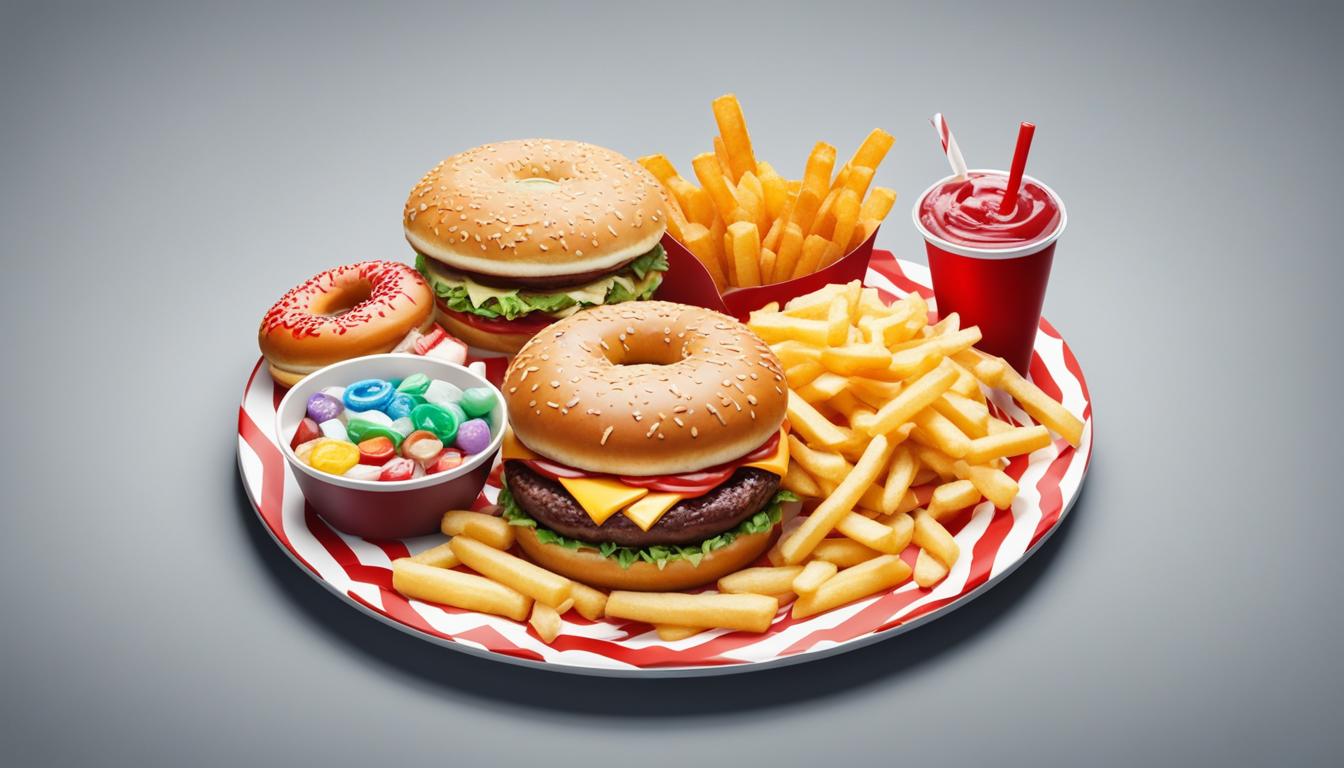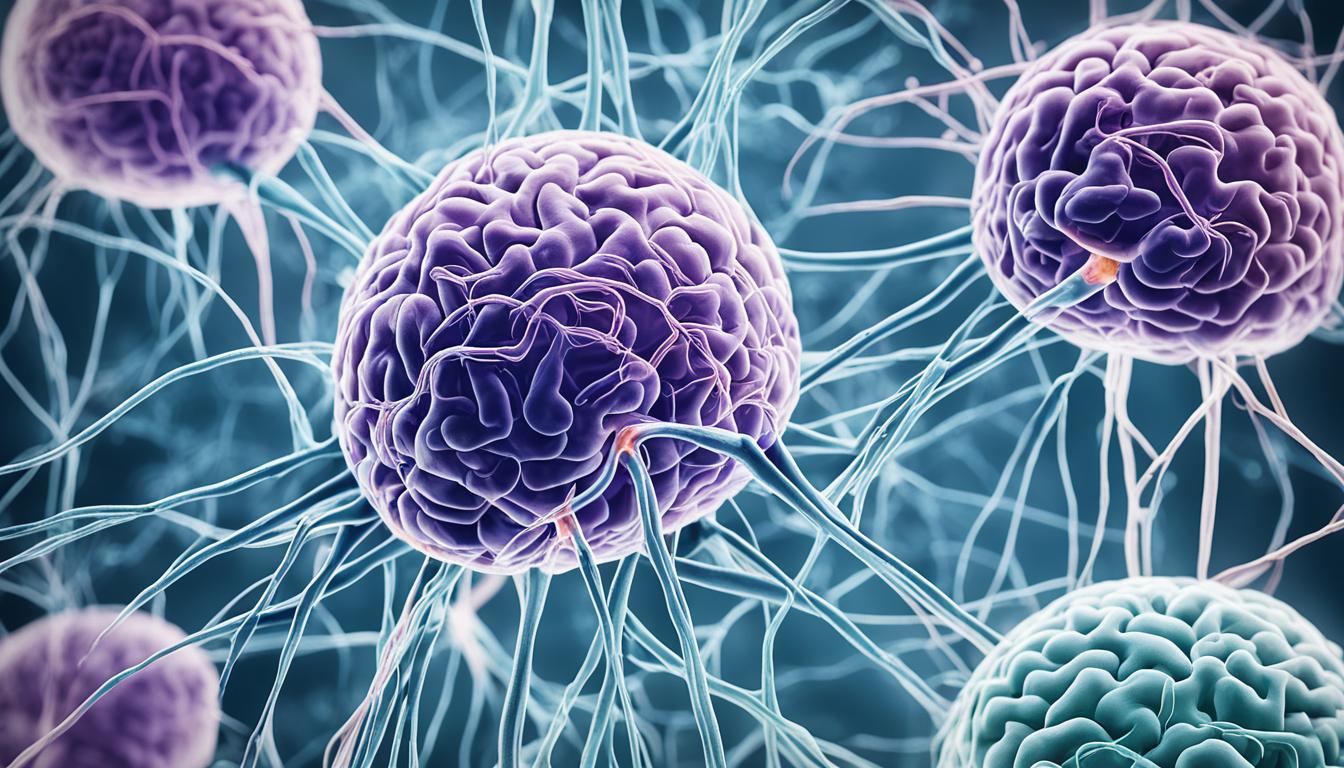Welcome to our guide on foods to avoid for better health. In this article, we will highlight some of the worst foods that you should steer clear of to maintain optimal well-being. By being mindful of the foods you consume and making informed choices, we can support our physical, mental, and emotional health.
Key Takeaways:
- Avoid soda, as it offers no nutritional value and can potentially harm your health.
- Steer clear of raw or undercooked meat, as it may contain harmful bacteria.
- Limit your consumption of processed meats, as they have been linked to various health conditions.
- Avoid alcohol during cancer treatment to promote recovery and balance.
- Reduce your intake of foods high in trans fats and refined vegetable oils to lower the risk of cardiovascular disease.
It’s important to remember that moderation is key. While it’s best to eliminate these foods from your regular diet, occasional indulgences can still be enjoyed without compromising your overall health. As always, it is recommended to consult with a healthcare professional or registered dietitian for personalized dietary recommendations.
Foods That Affect Brain Health – What to Avoid for Optimal Cognitive Function
When it comes to brain health, the food we eat plays a crucial role in supporting our cognitive function, memory, and focus. Certain foods can have a negative impact on our brain health, while others can help keep our memory sharp and boost cognitive function. To ensure optimal brain health, it is important to be mindful of the foods we consume and make informed choices.
Here are some foods to avoid for brain health:
- Industrial and processed seed oils: Soybean, corn, rapeseed, cottonseed, sunflower, and safflower oils contain high levels of omega-6 fatty acids, which can lead to inflammation in the brain.
- Added and refined sugars: Foods with added sugars can raise glucose levels in the brain, impairing memory and reducing plasticity in the hippocampus.
- Ultra-processed foods: A diet high in ultra-processed foods may shorten telomeres, which are associated with healthy cellular aging, and increase the risk of mild depression.
- Artificial sweeteners: Foods with artificial sweeteners can disrupt gut bacteria and negatively affect mood. Aspartame, in particular, has been linked to anxiety.
- Fried foods: While comforting, fried foods have been linked to lower scores of memory and cognition.
To support brain health, it is beneficial to include foods that are rich in omega-3 fatty acids, antioxidants, and nutrients. Opt for low-mercury, fatty seafood like salmon and sardines, which are excellent sources of omega-3 fatty acids. Additionally, incorporating whole foods such as fruits, vegetables, whole grains, and nuts can provide essential vitamins, minerals, and antioxidants that support brain health.
Table: Foods to Avoid for Brain Health
| Foods to Avoid | Reason |
|---|---|
| Industrial and processed seed oils | Contain omega-6 fatty acids that can cause inflammation in the brain |
| Added and refined sugars | Raise glucose levels in the brain, impairing memory and reducing plasticity |
| Ultra-processed foods | May shorten telomeres and increase the risk of mild depression |
| Artificial sweeteners | Disrupt gut bacteria and negatively affect mood |
| Fried foods | Linked to lower scores of memory and cognition |
It’s important to nourish our brains with the right foods to support cognitive function. By avoiding these foods and choosing brain-boosting alternatives, we can promote brain health and enhance our overall well-being.
Foods to Avoid for Heart Health and Cholesterol Control
When it comes to maintaining a healthy heart and controlling cholesterol levels, certain foods should be avoided or consumed in moderation. These dietary choices can play a crucial role in reducing the risk of heart disease and promoting heart-healthy living. Here are some key foods to avoid:
- Foods made with vegetable shortening: Vegetable shortening, which often contains hydrogenated oils, can increase LDL “bad” cholesterol and lower HDL “good” cholesterol. This imbalance can lead to a higher risk of heart disease.
- Non-dairy coffee creamers: Non-dairy coffee creamers often contain hydrogenated oils, high-fructose corn syrup, and artificial sweeteners. These ingredients can negatively impact liver health and cause gastrointestinal issues.
- Diet soda: Although diet soda may seem like a healthier alternative, it is high in artificial sweeteners like aspartame. Studies have linked diet soda consumption to increased cancer risk, gastrointestinal problems, and the development of diabetes.
- Low-fat peanut butter: Low-fat peanut butter often contains added sugars and filler ingredients. Choosing natural peanut butter, rich in heart-healthy fats, provides better nutritional benefits.
- Packaged butter-flavored popcorn: Packaged butter-flavored popcorn typically contains artificial butter flavoring and chemicals in the microwaveable bags. These ingredients can cause inflammation and potentially harmful free radicals in the brain.
- Table salt and packaged gelatin desserts: Table salt, which has been bleached and stripped of minerals, and packaged gelatin desserts with artificial colors and sweeteners can contribute to inflammation and negative health effects.
- Packaged donuts and pre-made dough: Packaged donuts and pre-made dough often contain trans fats and artificial ingredients. These unhealthy components can increase the risk of heart disease, unhealthy cholesterol levels, and stroke.
Better Heart-Healthy Alternatives
While avoiding these foods, it’s essential to incorporate heart-healthy substitutes into your diet. Opt for foods such as fresh fruits, vegetables, lean proteins like fish and poultry, whole grains, and nuts. These choices can support a heart-healthy diet and reduce the risk of heart disease.
Remember, maintaining a heart-healthy lifestyle involves not only avoiding certain foods but also adopting a well-balanced diet along with regular exercise. Consult with a healthcare professional or registered dietitian for personalized dietary recommendations tailored to your specific needs.

Foods to Avoid for Healthy Aging and Cellular Wellness
As we age, it becomes increasingly important to nourish our bodies with foods that promote healthy aging and cellular wellness. By avoiding certain foods and making mindful choices, we can support our overall well-being and enhance our quality of life.
Avoid These Foods:
- Fruit canned in syrup: These contain added sugars that contribute to inflammation and can negatively impact cellular health. Instead, opt for canned fruits in 100% juice or water for a healthier option.
- Pre-made dough: High in artificial trans fats, pre-made dough increases the risk of heart disease, stroke, and other health issues. It’s best to avoid these unhealthy fats and choose healthier alternatives.
- Instant noodles: Stripped of fiber and nutrients, instant noodles offer little nutritional value and can have adverse effects on health when consumed regularly. Limit your intake of these processed and unhealthy options.
- Artificial sweeteners: Although they may seem like a healthier alternative to sugar, artificial sweeteners can have potential health impacts and unknown risks. It’s best to avoid them and consume regular sugar in moderation.
- Packaged butter-flavored popcorn: Made with artificial flavorings and chemicals, packaged butter-flavored popcorn can cause inflammation and have harmful effects on the body. Choose healthier snack options instead.
- Microwavable rice: Often containing artificial trans fats, microwavable rice increases the risk of heart disease, stroke, and other health problems. Opt for healthier alternatives such as whole grains or freshly cooked rice.
- Packaged gelatin desserts: These colorful treats may contain artificial colors and sweeteners that can negatively affect health. Some have warnings related to their impact on children’s attention and activity levels. It’s best to choose natural and healthier alternatives.
- Packaged donuts: High in refined carbs and trans fats, packaged donuts should be indulged in moderation to support healthy aging and cellular wellness. Opt for healthier options like homemade baked goods or fresh fruits instead.
By avoiding these foods and making healthier choices, we can promote healthy aging and cellular wellness. Remember, moderation is key, and it’s important to maintain a balanced and nutritious diet for overall well-being.
| Foods to Avoid | Effects on Healthy Aging and Cellular Wellness |
|---|---|
| Fruit canned in syrup | Contains added sugars that contribute to inflammation and negatively impact cellular health |
| Pre-made dough | High in artificial trans fats, increases the risk of heart disease, stroke, and other health issues |
| Instant noodles | Stripped of fiber and nutrients, offers little nutritional value and may have adverse effects on health |
| Artificial sweeteners | Can have potential health impacts and unknown risks; regular sugar is a better alternative |
| Packaged butter-flavored popcorn | Made with artificial flavorings and chemicals, can cause inflammation and harmful effects on the body |
| Microwavable rice | Often contains artificial trans fats, increases the risk of heart disease, stroke, and other health problems |
| Packaged gelatin desserts | May contain artificial colors and sweeteners that can negatively affect health; some have warnings related to their impact on children’s attention and activity levels |
| Packaged donuts | High in refined carbs and trans fats, should be indulged in moderation to support healthy aging and cellular wellness |
Make informed choices about the foods you consume to support healthy aging and cellular wellness. Consult with a healthcare professional or registered dietitian for personalized dietary recommendations based on your specific needs. By nourishing your body with the right foods, you can promote optimal well-being and enjoy a vibrant and fulfilling life.

Foods to Avoid for Skin Health and Aging
When it comes to maintaining healthy and youthful-looking skin, the old saying “you are what you eat” holds true. Your diet plays a vital role in the overall health and appearance of your skin. Certain foods can accelerate the aging process and contribute to skin problems, while others can nourish and promote a youthful complexion.
Here are some foods to avoid for skin health:
- Excess sugar consumption: Consuming too much sugar can lead to the formation of advanced glycation end products (AGEs) in the skin. These AGEs contribute to the loss of elasticity and firmness, promoting premature aging.
- Non-organic strawberries: Non-organic strawberries are often heavily contaminated with pesticides. These pesticides can have endocrine-disrupting effects, negatively impacting hormonal balance and potentially causing skin problems.
- Salami and cured meats: Salami and other cured meats are high in saturated fat and sodium nitrites. These ingredients can contribute to inflammation in the body and potentially harm skin health.
- Packaged butter-flavored popcorn: Packaged butter-flavored popcorn is often made with artificial flavorings and chemicals. These additives can cause inflammation in the body and have a negative impact on skin health.
To maintain healthy and vibrant skin, it’s important to be mindful of your diet and avoid these skin-damaging foods. Incorporating a balanced and nourishing diet can help promote youthful, glowing skin.
| Foods | Effect on Skin |
|---|---|
| Excess sugar | Promotes the formation of AGEs, leading to loss of elasticity and firmness |
| Non-organic strawberries | Heavily contaminated with pesticides, which can disrupt hormones and impact skin health |
| Salami and cured meats | High in saturated fat and sodium nitrites, contributing to inflammation and potential skin problems |
| Packaged butter-flavored popcorn | Made with artificial flavorings and chemicals that can cause inflammation and negatively impact skin health |
By being mindful of the foods you consume, you can support your skin’s health and slow down the aging process. Remember, a well-balanced diet is key to maintaining youthful and radiant skin.
Foods to Avoid for Weight Management and Blood Sugar Control
When it comes to maintaining a healthy weight and managing blood sugar levels, certain foods should be avoided or limited in your diet. These foods can have a negative impact on weight loss efforts and blood sugar control, making it more challenging to achieve your health goals. By being mindful of what you eat, you can optimize your weight management and blood sugar control for overall wellbeing. Let’s take a look at the foods you should avoid:
1. Breakfast Cereals made with processed flour and refined grains
Breakfast cereals that are made with processed flour and refined grains often have a high glycemic index. This means that they can cause a rapid spike in blood sugar levels, leading to disordered metabolism, obesity, and insulin resistance. Instead, opt for whole grain cereals or other low-glycemic breakfast options for better weight management and blood sugar control.
2. Processed Meats
Processed meats such as sausages, bacon, and lunch meats are high in sodium and preservatives. Consuming these meats regularly has been linked to increased obesity and heart disease risk. To promote healthy weight management and blood sugar control, choose lean protein sources like poultry, fish, tofu, or legumes instead.
3. Frozen Sweet Drinks
Frozen sweet drinks like slushies or frozen coffee drinks may be tempting, but they are high in sugar and often lack nutritional value. Consuming these beverages frequently can contribute to weight gain and blood sugar imbalances. Opt for unsweetened drinks or healthier alternatives like infused water or herbal tea to quench your thirst without the unwanted sugar and calories.
4. Packaged White Bread
Packaged white bread lacks nutritional value and is often stripped of fiber. Consuming this type of bread can cause blood sugar spikes and cravings, making it harder to manage your weight and blood sugar levels. Instead, choose whole grain bread or other alternatives like sprouted grain bread for a healthier option.
5. Instant Noodles
Instant noodles are low in fiber and nutrients, leaving you feeling unsatisfied and prone to overeating. These noodles can cause rapid blood sugar spikes, resulting in energy fluctuations and weight gain. Instead, opt for whole grain or vegetable-based noodles for a more nutritious and weight-friendly choice.
Summary
By avoiding or reducing the consumption of these foods, you can support your weight management and blood sugar control goals. Opt for whole, unprocessed foods that are rich in nutrients, fiber, and lean proteins. Remember to consult with a healthcare professional or registered dietitian for personalized dietary recommendations tailored to your specific needs. By making healthier choices, you can improve your overall health and well-being.
| Foods to Avoid | Reasons to Avoid |
|---|---|
| Breakfast cereals made with processed flour and refined grains | High glycemic index, disordered metabolism, obesity, insulin resistance |
| Processed meats | High in sodium, preservatives, increased obesity and heart disease risk |
| Frozen sweet drinks | High in sugar, lacking nutritional value, weight gain, blood sugar imbalances |
| Packaged white bread | Lacks fiber, blood sugar spikes, cravings, weight management difficulties |
| Instant noodles | Low in fiber, blood sugar spikes, energy fluctuations, weight gain |
Conclusion
A healthy diet is crucial for maintaining overall health and well-being. It is important to avoid or limit the consumption of foods high in added sugars, processed ingredients, and unhealthy fats. By making informed choices about the food we eat and being mindful of its impact on our health, we can support our physical, mental, and emotional well-being.
While it is possible to indulge in some of these foods occasionally, moderation is key. By maintaining a balanced and nutritious diet, we can enjoy a variety of foods while still prioritizing our health.
Remember to consult with a healthcare professional or registered dietitian for personalized dietary recommendations that suit your specific needs. They can provide guidance on how to create a healthy and sustainable eating plan that supports your individual goals and lifestyle.
By avoiding or reducing the consumption of these foods, we can take proactive steps towards maintaining optimal health and well-being. Our bodies deserve to be nourished with wholesome and nutrient-rich foods, allowing us to live a vibrant and fulfilling life.
FAQ
What foods should I avoid for better health?
To promote better health, it’s advisable to avoid or limit foods that offer little nutritional value and can potentially harm your well-being. These include soda, raw or undercooked meat, processed meats, alcohol, trans fats, high fructose corn syrup, refined vegetable oils, take-out food, processed white bread, and excess sugar consumption.
How do certain foods affect brain health?
Some foods can impact brain health and cognitive function negatively. It is best to avoid or limit foods that contain artificial sweeteners, fried foods, high-mercury fish, refined carbohydrates, non-organic strawberries, salami and cured meats. Instead, opt for foods rich in omega-3 fatty acids like salmon and sardines, and avoid those that have a low nutritional value.
What foods should I avoid for heart health and cholesterol control?
To maintain a healthy heart and cholesterol levels, it’s recommended to avoid or limit foods such as processed meats, foods made with vegetable shortening, non-dairy coffee creamers, diet soda, low-fat peanut butter, and packaged donuts. These foods can increase the risk of heart disease and negatively impact heart health. Opt for healthier alternatives and natural options.
What foods should I avoid for healthy aging and cellular wellness?
For healthy aging and optimal cellular wellness, it’s best to avoid or limit foods like processed meats, packaged butter-flavored popcorn, table salt, packaged gelatin desserts, high in trans fats and artificial ingredients. Instead, focus on consuming nutrient-dense foods like low-mercury, fatty seafood, whole grains, and fresh fruits and vegetables rich in antioxidants.
How do certain foods affect skin health and aging?
Some foods can accelerate aging and contribute to skin problems. It’s recommended to avoid or limit the consumption of foods such as excess sugar, non-organic strawberries, salami and cured meats, and packaged butter-flavored popcorn. Instead, incorporate foods that promote healthy skin, such as those rich in antioxidants and omega-3 fatty acids.
What foods should I avoid for weight management and blood sugar control?
To manage weight and maintain stable blood sugar levels, it’s advisable to avoid or limit foods like breakfast cereals made with processed flour, frozen sweet drinks, packaged white bread, instant noodles, and foods high in refined carbs. Opt for whole foods, lean proteins, and complex carbohydrates to support healthy weight management and blood sugar control.
Why is a healthy diet important for overall well-being?
A healthy diet is crucial for overall health and well-being. By making informed choices about the foods we consume, we can support physical, mental, and emotional health. It is important to avoid or limit foods high in added sugars, processed ingredients, and unhealthy fats, and instead focus on nutrient-dense options. Consulting with a healthcare professional or registered dietitian can provide personalized dietary recommendations.
Can Eating Tomatoes Improve Overall Health and Wellbeing?
Some studies suggest that prostate health benefits tomatoes can improve overall wellbeing. Tomatoes are rich in lycopene, a powerful antioxidant that may reduce the risk of prostate cancer. Additionally, their high vitamin C content can boost the immune system, supporting overall health. Incorporating tomatoes into your diet can be a simple way to enhance your wellbeing.
Source Links
- https://www.cnbc.com/2022/12/02/harvard-nutritionist-and-brain-expert-shares-worst-foods-that-weaken-memory-and-focus.html
- https://www.prevention.com/food-nutrition/g20498199/50-foods-you-should-never-eat/
- https://www.prevention.com/food-nutrition/g41293496/15-foods-doctors-say-you-should-cut-from-your-diet/



